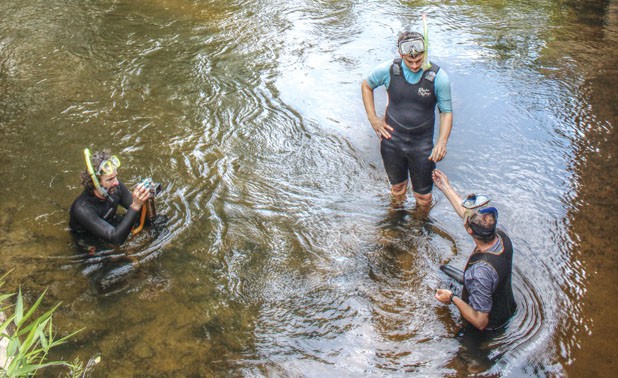“Each mussel is its own little wastewater treatment plant,” Peeples says. “Mussels clean the water for us, which is an incredible service they provide, free of charge, and one that we should support as much as possible.”
The biologists carefully remove the mussels, check to see if they had been tagged, make a note of the size and type of species, and then carefully return them to the exact same place they had been found.
In the late 1990s, the FWS had considered removing the Appalachian elktoe from the endangered species list because its numbers had begun to improve. But in the past few years, mussel populations have declined dramatically. Fridell believes the die-offs could have been caused by a combination of pollutants in the river and an extended drought, which reduced water levels and made the toxins in the water more potent.
“I’ve been working in this field for about 32 years now,” Fridell says. “I’ve seen changes that I wouldn’t have expected to see in my lifetime—just rapid degradation of aquatic systems. It’s just amazing to me how quickly we can destroy a lot of these systems. I’ve seen changes that I would rather not have seen, and for them to happen so quickly, I just didn’t expect it.”
Despite the overall decline in mussel populations, all hope is not lost. The Tuckaseegee River and parts of the Nolichucky are showing dramatic improvements. And today’s river snorkeling findings confirm that the Little River is doing remarkably well, too.
“It’s rare that you can go places and see the number of mussels and variety of aquatic wildlife that we saw today,” says Fridell.
Flex Your Mussels: How to help the Elktoe
- Establish forested streamside buffers. Several programs are available to assist landowners with restoring and protecting streamside buffers and eroding streams.
- Control erosion and stormwater, especially after rain.
- Minimize or eliminate use of fertilizers, pesticides, and other chemicals. What you spray on your lawn or dump down the drain will eventually wind up in nearby rivers and streams.
- Support local, state and national clean water legislation.
- Report illegal dumping activities, erosion, and sedimentation problems.
- Protect remaining wildlands and the restoration of damaged ecosystems.








